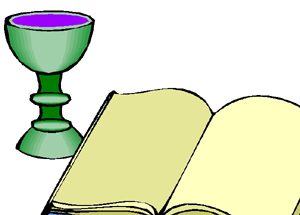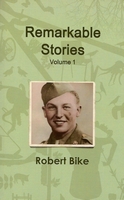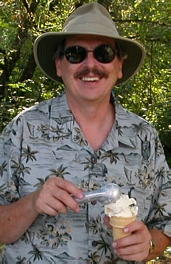
Robert
Bike
Licensed
Massage Therapy #5473
Eugene, Oregon
EFT-CC, EFT-ADV
Teaching Reiki Master
Life Coach
Gift Certificates
|
Reiki
Private classes. |
|
Member
OMTA & ABMP President of the Oregon Massage Therapists Association 2008-2010 & 2012-2013 |
|
I
graduated from Freeport (Illinois) High School. |
|
Please
help keep
this site free. Buy one of my books, on sale below. All sales go to help support this website. |
|
Remarkable
Stories, Remarkable
events have happened in Freeport and Stephenson County, Illinois,
and remarkable people have lived there. These are stories
gathered about people and events from 1835 through World War
II. |
|
Biblical
Aromatherapy
by Robert Bike 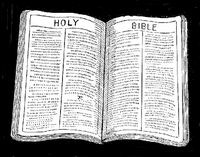
The Bible mentions about 232 plants by name, or closely enough to figure out what plant is meant. Of these, 24 are aromatic plants; that is, parts of the plants can be pressed or distilled to get an essential oil. Essential oils are the lifeblood of plants and have tremendous healing capabilities. The
healing power of plants is the basis for modern medicines.
Originally published in manuscript form in 1999, I completely revised the book and added illustrations. To
order Biblical Aromatherapy in paperback, List price $24.99; introductory offer $19.99 To order the pdf version and download to your computer or phone, The electronic version is only $2.99! |
Publicity!
|
Olga
Carlile, columnist for the Freeport (Illinois) Journal Standard,
featured this website in her column on January 19, 2007. |
|
Harriet
Gustason, another columnist for the Freeport Journal Standard,
has featured this website twice. Click to see pdf of articles:
June 29, 2012 November 3, 2012 |
|
"My
Life Purpose is to inspire my friends |
Robert Bike, LMT, LLC
The Class of 1858
Leonard Stoskopf, attorney and Police Magistrate in Freeport.
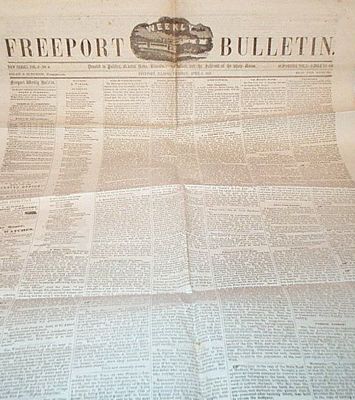
The
Weekly Freeport Bulletin
from April 8, 1858
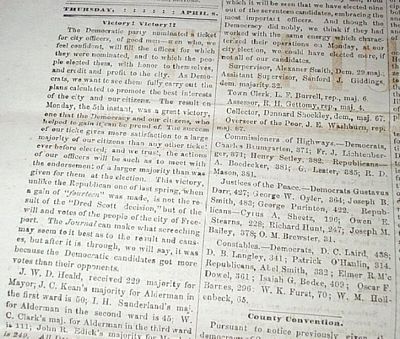
Showing
the mayoral election results.
Democrat John W. D. Heald received 229 votes
and was elected as Freeport's third mayor.
1858 was the year of the Lincoln-Douglas debates. Abraham Lincoln spent the night before the debate at the Brewster House hotel. His Republican supporters had planned a spectacle. A local farmer had a large wagon with four large grey horses. The wagon was described as a Pennsylvania farm wagon, looking like a boat on wheels. They planned to have Lincoln ride on the driver's seat while the farmer guided the horses while riding one horse, with an empty wagon. Lincoln thought that was ridiculous, and climbed onto the driver's seat next to the farmer.
He then turned to his Republican supporters, the elected politicians of Stephenson County, and told them to go into the hotel and bring out chairs to put in the wagon so they could sit. When they were all seated in the back of the wagon, the farmer drove the team and wagon through downtown Freeport, up Stephenson and down Galena (now Main Street), weaving back and forth through the side streets. Other Lincoln supporters followed in other wagons, on horseback, and walking in the impromptu parade.
Most of Freeport's population of five thousand souls were downtown, along with a crowd of an estimated twenty thousand from all over the area. Special trains brought spectators from Rockford, Chicago, Peoria and all points around Freeport. It was a raucous parade, and the crowd was eager for the debate. Eventually the farmer ended up at the debate site, just two short blocks from the hotel!
[This story was pieced together from information from the 1970 History of Stephenson County; from Will F. Bennethum, who witnessed the events and the debate; and from Anna Musser Shoesmith Pickard, whose maternal grandfather was the farmer; and from family stories. The farmer's name? William Bike, my great-great-grandfather!]
Thomas Turner, a Freeport politician, whom I wrote about here, was on the platform with Lincoln & Douglas, and spoke during the debates.
But what were the debates about? And what was the Freeport Doctrine? And why is it important?
Stephen
A. Douglas was running for re-election as the United States Senator from
Illinois. His opponent was a little-known politician from Springfield
by the name of Abraham Lincoln. Though at the time Senators were elected
by state legislatures, the populace, who elected the legislators, was
excited by the major topic of the day, slavery and the rights of new states
to determine whether to allow slavery or to ban it. Douglas and Lincoln
had spoken in Chicago and Springfield within a day of each other, and
referred to each other in their speeches. They decided on a debate in
each of the remaining seven congressional districts, Ottawa, Freeport,
Jonesboro, Charleston, Galesburg, Quincy and Alton.
The United States was one of the last remaining major countries of the world to allow slavery, and once it was banned in the U.S., this despicable practice largly disappeared from the world. And what happened in Freeport led to the banning of slavery in the U.S. This is why the Freeport Doctrine is so important: it led to the world-wide ban on slavery.
Major newspapers from Chicago and other points sent stenographers who recorded every word. From a time before TV and radio, the newspapers were avidly read all across America and around the world. The format of the debate in Ottawa was that Douglas spoke first for 60 minutes, Lincoln spoke for 90 minutes, then Douglas spoke for 30. In Freeport, Lincoln started, and they alternated who spoke first for the rest of the debates.
Lincoln believed and said that the U. S. Constitution represented all people, blacks as well as whites. Douglas stated that states had the right to determine whether they be free or slave. And, each represented the other as holding more extreme views than they actually did.
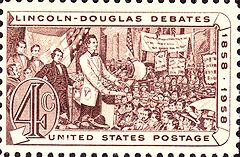 Illinois
prohibited slavery in its 1819 Constitution, and was a free state.
Illinois
prohibited slavery in its 1819 Constitution, and was a free state.
The Chicago Daily Journal wrote (shown above), "There was an immense assemblage of the people of Northern Illinois at Freeport yesterday. Thay came down from above, and came up from below, in scores and hundreds. all the regular railroad trains and one or two special excursion trains, both on Thursday night and on Friday morning, brought in great crowds, and hundreds of others came in with teams from all directions.
 "The
Hon. T. J. Turner of Freeport introduced Mr. Lincoln, who was greeted
with the most vociferous huzzahs of the multitude. He commenced by saying
that at Ottawa, Judge Douglas put seven interrogatories to him, which,
not having time to answer then, he would answer now. He repeated Douglas's
questions and replied to them . . . ."
"The
Hon. T. J. Turner of Freeport introduced Mr. Lincoln, who was greeted
with the most vociferous huzzahs of the multitude. He commenced by saying
that at Ottawa, Judge Douglas put seven interrogatories to him, which,
not having time to answer then, he would answer now. He repeated Douglas's
questions and replied to them . . . ."
Douglas, as a United States Senator, had sponsored the Kansas-Nebraska Act, which legalized new states to allow the people to vote on whether the state would be slave or free, known as popular sovereignty. Lincoln argued that popular sovereignty could lead to slavery going nation-wide and that slavery would grow. Douglas called the new Republican Party the Black Republican Party and accused Lincoln of being an abolitionist, a position that Lincoln had not yet gravitated to. Lincoln, talking about black men, stated, "...he is not my equal in many respects—certainly not in color, perhaps not in moral or intellectual endowment. But in the right to eat the bread, without the leave of anybody else, which his own hand earns, he is my equal and the equal of Judge Douglas, and the equal of every living man."
Lincoln abhorred the practice of slavery: "I cannot but hate. I hate it because of the monstrous injustice of slavery itself. I hate it because it deprives our republican example of its just influence in the world—enables the enemies of free institutions, with plausibility, to taunt us as hypocrites—causes the real friends of freedom to doubt our sincerity, and especially because it forces so many really good men amongst ourselves into an open war with the very fundamental principles of civil liberty—criticizing the Declaration of Independence, and insisting that there is no right principle of action but self-interest."
Lincoln, the great debator, forced Douglas into making a choice between popular sovereignty and the Supreme Court's Dred Scott decision, which ruled that African-Americans could never be U.S. citizens and were not protected by the U.S. Constitution, that the U.S. Congress could not prohibit slavery in the territories, and that because African-Americans were not citizens, that they could not sue in court.
Douglas said that people of a territory could ban slavery, which became known as the Freeport Doctrine. This position alienated Southerners and pro-slavery people.
Douglas won his bid for re-election as U. S. Senator from Illinois.
Two years later, in 1860, the new Republican Party, based on his performance in the 1858 debates, nominated Lincoln as their candidate for president. Southerners, demanding slave laws for the territories, split the Democratic Party. Douglas was the candidate of the Northern Democrats and John Breckinridge was the candidate of the pro-slavery Southern Democrats. A fourth candidate, John Bell, ran under the Constitutional Union banner, hoping for a compromise to avoid what seemed to be a coming civil war.
Lincoln won both the electoral college (180-72 over Breckenridge) and the popular vote (1,865,908 to 1,380,201 over Douglas). Seven southern states seceded from the Union between Lincoln's election and his inauguraton, leading to the Civil War. On September 22, 1862, Lincoln announce the Emancipation Proclamation (above), which freed the slaves. On December 18, 1865, the 13th Amendment to the Constitution was passed, banning slavery forever in the United States.
Although slavery is now banned in all countries, it still exists nearly everywhere as people try to control other people for economic gain, political power, sex and labor.
